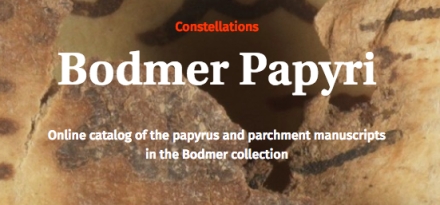 In the volume on Holy Scripture in his studies in dogmatics, G. C. Berkouwer, theologian at the Free University of Amsterdam, has a few pages on textual criticism. The discussion follows that of his predecessors Abraham Kuyper and Herman Bavinck quite closely and is worth a read even though I would probably demur at several points.
In the volume on Holy Scripture in his studies in dogmatics, G. C. Berkouwer, theologian at the Free University of Amsterdam, has a few pages on textual criticism. The discussion follows that of his predecessors Abraham Kuyper and Herman Bavinck quite closely and is worth a read even though I would probably demur at several points.There are a number of issues worth discussing from Berkouwer, but I want to focus here on just one point because it is something I have heard many times from Christians. It is an answer to why, given the divine origin of the Bible, God did not preserve the actual autographs for us. Here is what Berkouwer writes:
The acceptance of this “textual criticism” is clearly related to the manner in which Holy Scripture was given to us. Obviously, it was not given to us in such a form that on the subjective human side it was merely possible and permissible to listen, with the exclusion of any “judgment.” Concern for a correct text shows clearly that this listening is set in a certain context. Textual criticism would be superfluous, according to Kuyper, “if it had pleased God to leave us perfect autographs.” Since this is not the case, we must respect the historical “aspects related to it.” Kuyper’s opinion about why the original handwriting is no longer at our disposal is that “such autographs would soon lead to idolatry, and it apparently pleased God to subject his Holy Scripture to the vicissitudes of time to ward off this evil rather than subject his church to the temptation of idolatry.” (Holy Scripture, p. 219)In other words, the uncertainty that comes with textual criticism is better than that temptation to idolize the autographs that would come if we had them still. I have heard this a number of times as an explanation for why the need for textual criticism is okay. To his credit, Berkouwer goes on to say that
Opinions will differ concerning these considerations of divine motivations and providential intentions concerning the loss of the “autographs.”I say that this caveat is to Berkouwer’s credit because no matter how often I hear it, I have yet to find this reason very convincing.
It’s not because I don’t think God has any good reasons for withholding the original ink and parchment from us (he must, after all); it’s because I don’t see him saving us from countless other things our “idol factory” hearts worship like money, power, sex, or influence. If God doesn’t keep these things from us because we idolize them, why would he keep the autographs from us either? After all, idolizing these things creates far greater problems than any idolizing of the autographs would. What’s more, doesn’t God have other ways of addressing the problem of idolatry? And wouldn’t the first generation of Christians face this same temptation? Why not save them from it too?
It’s not that I’m against any suggestion for why God didn’t preserve the autographs—for instance, he didn’t need to; he isn’t afraid of the uncertainty that comes with textual criticism; he likes our blog; he knows I need a job; etc., etc.—it’s just that idolatry isn’t a convincing one.





















